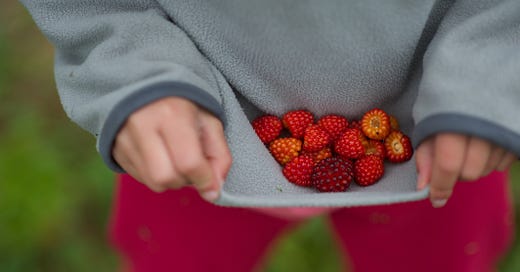It's a small book, flimsy even. A powder blue cover hardly thicker than the pages they wrap around with a French flap. A faded cover photo of fading light on a mountainside. A man in a long coat looking away, his eyes on a flock of sheep that are mounded like boulders in the mist.
I first came across The Serpent of Stars when Wren, my daughter, was a baby. Being a shepherd myself, I was drawn to the cover, and to the stirring words on the back: ""Open yourself!" it read in italic font. "Here you are crossed by the suns and the clouds; here you are traveled by wind." The words cut directly to my longing in the tightly wrapped cocoon - enraptured, but also in bondage - that is new motherhood. I was beholden to a baby and a flock of sheep that was in the middle of lambing, to things that needed my body to be present day and night. The nomad in me lived vicariously through Giono's shepherds in the mountains of southern France, wandering with their flocks that stretched and undulated like a vast ocean around them.
The Serpent of Stars is a strange novella, and an enigma to me still. But it has become a talisman over the two decades since I first brought it home, most of all as I write a book now about shepherding and raising a daughter and the dwindling of my mother's mind. Just having it nearby helps me to make meaning of a life that is essentially so unremarkable, so washed in daily chores, the changes of the seasons and ordinary human frailties. I love how Giono, in the strangeness of his imagination, makes a suptuous feast from the simplicity of grass and night. The beauty of his words reminds me how essential simple things are, and how far from simple it is to appreciate them, to make art of them.
As Giono's novel is a talisman to me, the salt stones that Giono's shepherds put out in the fields for the flock are their talismans. He writes (in a footnote): "In the high pastures, the shepherds go find flat rocks and they line them up in the grass. These are the salt stones. Every night, the shepherds pour four or five handfuls of rough gray salt on these flat rocks. It's for the nursing ewe, it's for the trembling young lamb, it's for the good sheep huddled with cold or the one who has a thorn in its foot; it's a consolation and a remedy..."
I read those words and thought, this is what I want my book to be: a consolation and a remedy. I want to pass something on. I'm not sure I can describe what that is exactly, but as I write my book, The Salt Stones, I have this need to share what might best be described, simply, as feeling fully alive.
I hope to share here stories that don't make it into the book but which spring from the same source. I hope they will register in some essential way - like a grain of salt on the tongue. Thank you, thank you for reading.




